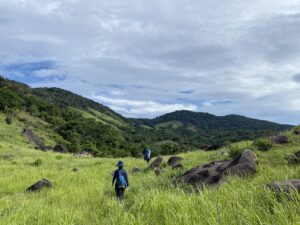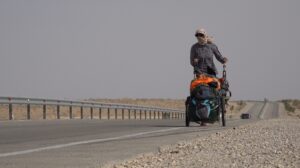Newfoundlander Justin Barbour sets out next week with his dog, Saku, to trek and canoe 1,700km west across Canada’s boreal forest from North West River, Labrador to the tiny village of Kuuijjuarapik, Quebec, on the shores of Hudson Bay.
Barbour has delayed his journey to be best man at his brother’s wedding this weekend. The late start means that he expects to finish the journey by early November.
This is the 30-year-old teacher’s second major expedition. Last year, he completed a 68-day, 700km crossing of the island of Newfoundland.

Justin Barbour pulls in to Cape Broyle at the end of last year’s Newfoundland crossing. Photo: Justin Barbour
Barbour became interested in wilderness expeditions after reading The Lure of the Labrador Wild, the classic account of the ill-fated 1903 Hubbard expedition through the same part of Labrador. Leonidas Hubbard, a New York magazine editor, also left from North West River by canoe. Hubbard starved to death; his two companions barely survived.
“I watched documentaries, read books and saw people doing these trips,” said Barbour. “I just got hooked. I think it’s a combination of my love of the outdoors and getting away from the real world a little. I’ve been an athlete and always liked pushing myself.”
He plans to travel from North West River to the Naskaupi River — missing this key waterway was the start of the Hubbard tragedy. As the Naskaupi climbs onto the Labrador plateau, he will have to portage around many wild rapids. A short overland crossing then brings him to the Red Wine River. From here, a mix of paddling and hiking leads to the Smallwood Reservoir, formerly Lake Michikamau and now Canada’s 10th largest lake, 180 km to the west. This overland slog is the most difficult part of the journey, according to Barbour. “I expect it will take a minimum of 20 days,” he says.
After paddling across this big body of water, Barbour will follow a chain of lakes and rivers into Quebec’s Caniapiscau Reservoir, another giant, island-dotted lake much-expanded from its historic size by flooding for hydro projects. By now, he will be deep into unstable fall weather and he risks being windbound for long periods. But by this time, at least the infamous subarctic mosquitoes and black flies will have subsided. Finally, he will travel 734km down the Great Whale River to Hudson Bay.
Barbour will start out with 25 days of food and will rely on two air drops along the way. Apart from his 56-pound Esquif canoe, he will carry up to 60 pounds of food and about the same weight in equipment. Each portage may take two or even three carries when his load is topped up. He expects to shoulder or tow the canoe up to 10km at a time on the longest portages.
Saku, a Sporting Cape Shore water dog, will carry 15 days of dog food, his bowl and a GoPro with a rain cover to help record their quest. “He’s grown by 30 pounds since our last trip, so there won’t be much room in the canoe,” Barbour said.

Justin Barbour and Saku. Photo Justin Barbour
Communication will be via satphone, and a Garmin InReach will allow his Facebook page, The Newfoundland Explorer, to show his position regularly.
The cost of the expedition, has been partly funded by The Royal Canadian Geographic Society and Mountain Equipment Coop.
Below, Barbour’s video previewing his expedition.






